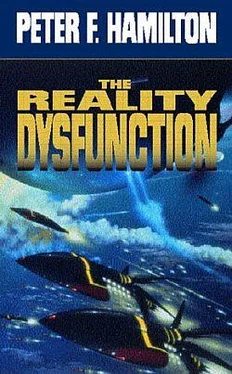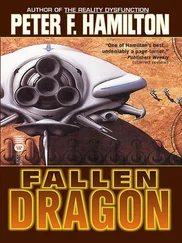“That was something else I wanted to bring up. I’ve just finished accessing the latest schedules flek from the board; they’re going to send us five colonist-carrier starships over the next seventy days.”
“Typical.” Colin couldn’t even be bothered with a token protest.
“I was thinking we might ask the river-boat captains to take more passengers each trip. They could easily cram another fifty on board if they rigged up some awnings over the open decks. It wouldn’t be any different from the transients’ dormitories, really.”
“You think they’d go for that?”
“Why not? We pay their livelihood, after all. And it’s only temporary. If they don’t want to take them, then they can sit in harbour and lose money. The paddle-boats can hardly be used for bulk cargo. Once we’ve repossessed the boats, we’ll give them to captains who are more flexible.”
“Unless they all band together; those captains are a clannish lot. Remember that fuss over Crompton’s accident? He rams a log, and blames us for sending him off into an uncharted tributary. We had to pay for the repairs. The last thing we need right now is an outbreak of trade unionism.”
“What shall I do, then? The transients’ dormitories can’t hold more than seven thousand at once.”
“Ah, to hell with it. Tell the captains they’re taking more heads per trip and that’s final. I don’t want the transients in Durringham a moment longer than necessary.” He tried not to think what would ever happen if one of the paddle-boats capsized in the Juliffe. Lalonde had no organized emergency services; there were five or six ambulances working out of the church hospital for casualties in the city, but a disaster a thousand kilometres upriver . . . And the colonists were nearly all arcology dwellers, half of them couldn’t swim. “But after this we’ll have to see about increasing the number of boats. Because as sure as pigs shit, we won’t ever get a reduction in the number of colonists they send us. I heard on the grapevine Earth’s population is creeping up again, the number of illegal births rose three per cent last year. And that’s just the official illegals.”
“If you want more boats, that will mean more mortgage loans,” Terrance observed.
“I can do basic arithmetic, thank you. Tell the comptroller to shrink some other budgets to compensate.”
Terrance wanted to ask which divisions, every administration department was chronically underfunded. The look on Colin Rexrew’s face stopped him. “Right, I’ll get onto it.” He loaded a note in his neural nanonics general business file.
“It wouldn’t be a bad idea to look into safety on those paddle-boats some time. Make them carry lifebelts.”
“Nobody in Durringham makes lifebelts.”
“So that’s a fresh business opportunity for some smart entrepreneur. And yes I know it would need another loan to establish. Hell, do we have a cork-analogue tree here? They could carve them, everything else on this bloody planet is made out of wood.”
“Or mud.”
“God, don’t remind me.” Colin glanced out of the window again. The clouds had descended until they were only about four hundred metres above the ground. Dante got it all wrong, he thought, hell isn’t about searing heat, it’s about being permanently wet. “Anything else?”
“Yes. The marshal you sent up to Schuster County has filed his report. I didn’t want to load it into the office datanet.”
“Good thinking.” Colin knew the CNIS team monitored their satellite communications. There was also Ralph Hiltch sitting snugly over in the Kulu Embassy, like a landbound octopus with its tentacles plugged into damn near every administration office, siphoning out information. Although God alone knew why Kulu bothered, maybe paranoia was a trait the Saldanas had geneered into their super genes. He had also heard a strictly unofficial whisper that the Edenists had an active intelligence team on the planet, which was pushing credulity beyond any sane limits.
“What was the summary?” he asked Terrance.
“He drew a complete blank.”
“Nothing?”
“Four families have definitely gone missing, just like the sheriff said. All of them lived out on the savannah a fair distance away from Schuster town itself. He visited their homesteads, and said it was like they walked out one morning and never came back. All their gear had been looted by the time he arrived, of course, but he asked around, apparently there was even food laid out ready for a meal in one home. No sign of a struggle, no sayce or kroclion attack. Nothing. It really spooked the other colonists.”
“Strange. Have we had any reports of bandit gangs operating up there?”
“No. In any case, bandits wouldn’t stop after just a few families. They’d keep going until they were caught. Those families disappeared nine weeks ago now, and there have been no reports of any repetition. Whatever did happen, it looks like a one off.”
“And bandits would have stripped the homesteads of every remotely useful piece of gear, anyway,” Colin mused out loud. “What about the Tyrathca farmers? Do they know anything?”
“The marshal rode out to their territory. They claim they’ve had no contact with humans since they left Durringham. He’s pretty sure they’re telling the truth. There was certainly no sign of any humans ever being in their houses. His affinity-bonded dog had a good scout round.”
Colin stopped himself from making the sign of the cross; his Halo asteroid upbringing had been pretty formal. Supervisors and sheriffs using affinity was something he could never get used to.
“The families all had daughters; some teenagers, a couple in their early twenties,” Terrance said. “I checked their registration files.”
“So?”
“Several of the girls were quite pretty. They could have moved downriver to one of the larger towns, set up a brothel. It wouldn’t be the first time. And from what we know, conditions in Schuster are fairly dire.”
“Then why not take their gear with them?”
“I don’t know. That was the only explanation I could think of.”
“Ah, forget it. If there aren’t any more disappearances, and the situation isn’t developing into an insurrection, I’m not interested. Write it down to an animal carrying them off for nest food, and call the marshal back. Those colonists know the risks of alien frontiers before they start out. If they’re mad enough to go and live out in the jungle and play at being cavemen, let them. I’ve got enough real problems to deal with at this end of the river.”
Quinn Dexter had heard of the disappearances, it was all round the Aberdale village camp the day a party from Schuster made their official welcome visit to Group Seven. Four complete families, seventeen people flying off into thin air. It interested him, especially the rumours. Bandits, xenocs (especially the Tyrathca farmers over in the foothills), secret metamorph aborigines, they had all been advanced as theories, and all found wanting. But the metamorph stories fascinated Quinn. One of Schuster’s Ivets told him there had been several sightings when they had first arrived a year ago.
“I saw one myself,” Sean Pallas told him. Sean was a couple of years older than Quinn, and could have passed for thirty. His face was gaunt, his ribs were starkly outlined. Fingers and arms were covered in red weals, and pocked sores where insects had bitten him. “Out in the jungle. It was just like a man, only completely black. It was horrible.”
“Hey,” Scott Williams complained. He was the only Afro-Caribbean among Aberdale’s eighteen Ivets. “Ain’t nothing wrong with that.”
“No, man, you don’t understand. It didn’t have any face, just black skin, there was no mouth or eyes; nothing like that.”
Читать дальше












